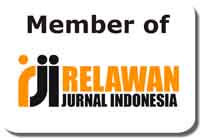Intercultural Communicative Competence Levels of Indonesian EFL Students: A Preliminary Study in a Higher Education Context
Abstract
The lack of intercultural communication skills will likely cause disharmony, misunderstanding, and even conflict in communication. To be successful in communication with native speakers depends on language skills, customs, and cultural knowledge. In the age of global communication, English as a Foreign Language (EFL) teaching goals should be reoriented to cultivate intercultural communication competence (ICC). EFL learners should have this intercultural competence and be sensitive in order to avoid disharmony, misunderstandings, and even conflicts in communication. The main objective of this preliminary study is to reveal the levels of intercultural communicative competence among EFL students at a state university in Indonesia. A survey questionnaire was performed employing a quantitative analysis in this study. Eighty-nine students filled out the ICC questionnaire, which consisted of 20 questions. Findings indicated that most of the students had a low ICC level because they are lack of experience and knowledge in interacting and socializing with people from various cultural backgrounds. In terms of gender differences, the results showed that male students had higher levels of ICC than that female students. This research implied that intercultural topics should be included in the university’s curriculum.
Keywords
Full Text:
PDFReferences
Aljohani, N. (2016). The goals of language teaching. International Journal of Scientific & Engineering Research, 7(3), 442-445. https://www.ijser.org/researchpaper/The-Goals-of-Language-Teaching.pdf
Bennet, J. (2008). On becoming a global soul. In Victor Savicki (Ed.). Developing intercultural competence and transformation: Theory, research, and application in international education, (pp. 13-31). Stylus Publishing, LLC.
Byram, M. (1997). Teaching and assessing intercultural communicative competence. Clevedon: Multilingual Matters.
Chen, G. M., & Stratosta, W. J. (1999). A review of the concept of intercultural awareness. Human Communication, 2, 27-54. https://files.eric.ed.gov/fulltext/ED408634.pdf
Cubukcu, F. (2013). Pre-Service English teachers’ intercultural sensitivity. International Journal of Human Sciences, 10(1), 832-834. https://www.j-humansciences.com/ojs/index.php/IJHS/article/view/2270
Creswell, W. J. (2003). Research design: Qualitative, quantitative, and mixed methods approaches (2nd ed.). CA: Sage: Thousand Oaks.
Deardoff, D. K. (2009). The SAGE handbook of intercultural competence. Thousand Oaks, CA: SAGE Publications.
Fantini, A. (2010). Exploring multicultural competence: Defining, developing, and monitoring. USA, Home Page. Web: .
Fantini, A. E. (2020). Reconceptualizing intercultural communicative competence: A multinational perspective. Research in Comparative & International Education, 15(1), 52-61. https://doi.org/10.1177%2F1745499920901948
Fisher, J. M., & Marshall, P. A. (2009). Understanding descriptive statistics. Australian Critical Care, 22(2), 93-97. https://doi.org/10.1016/j.aucc.2008.11.003
Focho, G. (2011). Student perceptions of English as a developmental tool in Cameroon. In H. Coleman (ed.). Dreams and realities: Developing countries and the English language , (pp. 137-160). London: British Council.
Gulbinskienė, D., & Lasauskienė, R. (2014). Intercultural communicative competence (ICC) of EFL students at university level. Svetimosios Kalbos. 16(3), 150-159. DOI: 10.15823/zz.2014.020. http://dx.doi.org/10.15823/zz.2014.020
Jenkins, J. (2009). English as a Lingua Franca: interpretations and attitudes. World Englishes, 28(2), 200-207. https://doi.org/10.1111/j.1467-971X.2009.01582.x
Kumaravadivelu, B. (2008). Cultural globalization and language education. New Haven, CT: Yale University Press.
Lazar, I. (2007). Guidelines for the teaching of intercultural communicative competence. In Lázar, I. Lussier D., and Christian P. (ed). Developing and Assessing Intercultural Communicative Competence: A Guide for Language Teachers and Teacher Education, (pp. 5-19). Council of Europe: European Centre of Modern Languages.
Mairi, S. (2016). An English as Lingua franca (ELF) perspective in Asian English language teaching (ELT). Proceedings of the Fourth International Seminar on English Language and Teaching (ISELT 4) (pp. 283-293). Padang: Universitas Negeri Padang.
Matveev, A. (2002). The perception of intercultural communication competence by American and Russian managers with experience on multicultural teams. Ph. D. Thesis Unpublished. Athens, OH: Ohio University.
Miller, E. M., & Yang Costello, C. (2001). The Limits of Biological Determinism. American Sociological Review, 66(4), 592-598. https://doi.org/10.2307/3088924
Mirzaei, A., & Forouzandeh, F. (2013). Relationship between intercultural communicative competence and L2-learning motivation of Iranian EFL learners. Journal of Intercultural Communication Research, 42(3), 300-318. https://doi.org/10.1080/17475759.2013.816867
Moeller, J. A., & Nugent, K. (2014). Building intercultural competence in the language classroom. Faculty Publications: Department of Teaching, Learning and Teacher Education. Paper 161. https://digitalcommons.unl.edu/cgi/viewcontent.cgi?article=1160&context=teachlearnfacpub
Mostafaei Alaei, M., & Nosrati, F. (2018). Research into EFL teachers’ intercultural communicative competence and intercultural sensitivity. Journal of Intercultural Communication Research, 47(2), 73-86. https://doi.org/10.1080/17475759.2018.1424020
Nakamura, K. (2002). Cultivating global literacy through English as an international language (EIL) education in Japan: A New Paradigm for Global Education. International Education Journal, 3(5), 64-74.
Patricia, M. Y. (2005). Asian American adolescents and the stress of acculturation: differences in gender and generational levels. Ph. D. Thesis, Unpublished. Flagstaff, AZ: Northern Arizona University.
Portalla, T., & Chen, G.-M. (2010). The development and validation of the intercultural effectiveness scale. Intercultural Communication Studies, 19(3), 21-37. https://web.uri.edu/iaics/files/02TamraPortallaGuo-MingChen.pdf
Revelo, E. (2008). Exploring citizenship education at the university level in Colombia. In T. Jimenez & S. Sheehan (Ed.). Global citizenship in the English language classroom.
Samovar, A. L., Porter, E. R., & McDaniel, R. E. (2012. ). Intercultural communication: A reader. 13Th Ed. Boston: Wadsworth Cengage Learning.
Saricoban, A., & Oz, H. O. (2014). Research into pre-service English teachers’ intercultural communicative competence (ICC) in Turkish context. The Anthropologist. 18(2), 523-531. https://doi.org/10.1080/09720073.2014.11891570
Schuerholz-Lehr, S. (2007). Teaching for global literacy in higher education: How prepared are the educators?’. Journal of Studies in International Education. 11(2), 180-204. https://doi.org/10.1177%2F1028315307299419
Sercu, L., Mendez Garcia, M. D., & Castro Prieto, P. (2004). Culture teaching in foreign language education. EFL teachers in Spain as cultural mediators. Porta Linguarum. 1(1), 85-102. http://dx.doi.org/10.30827/Digibug.28351
Shaules, J. (2007, p. 100). Deep culture: The hidden challenges of global living. Clevedon, UK: Multilingual Matters.
Sperling, V., Ferree, M. M., & Risman, B. (2001). Constructing global feminism: Transnational advocacy networks and Russian women’s activism. Signs, 26(4), 1155-1186. https://www.jstor.org/stable/3175360
Tosuncuoglu, I. (2019). Intercultural communicative competence awareness of Turkish students and instructors at university Level. International Journal of Higher Education, 8(1), 44-54. https://doi.org/10.5430/ijhe.v8n1p44.
DOI: http://dx.doi.org/10.31332/lkw.v7i2.2870
Copyright (c) 2021 Anna Riana Suryanti Tambunan, Fauziah Khairani Lubis, Widya Andayani, Winda Setia Sari

This work is licensed under a Creative Commons Attribution-ShareAlike 4.0 International License.
Publisher:
UPT Pengembangan Bahasa, IAIN Kendari
Jln. Sultan Qaimuddin No. 17 Baruga, Kota Kendari, Sulawesi Tenggara
Website: upb.iainkendari.ac.id
Email: [email protected]


















